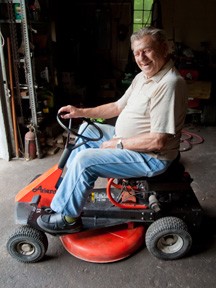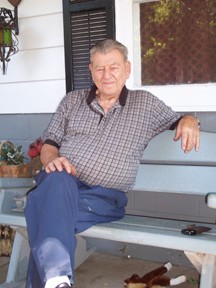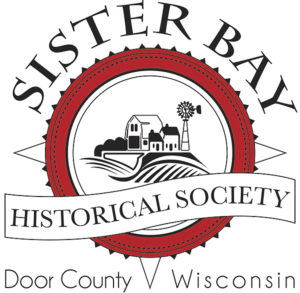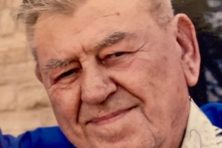Around the World in 11 Years: Jake Kodanko’s life on land and sea
- Share
- Tweet
- Pin
- Share

While his days used to be filled with convoys of ships in the Merchant Marines, Kodanko now tinkers on small engines like this lawnmower. Photo by Dan Eggert.
Some people learn geography studying maps; others, like Jake Kodanko, learn hands on. From 1943 to 1954 he served in the Merchant Marines, “traveling all over the world,” he recalls, “visiting 56 different countries, some several times.”
Now Kodanko makes his life on Beach Road near Sister Bay and the education that he received as a world traveler has given him sophistication that belies his present pastimes of fixing his neighbors’ lawnmowers and snow blowers, and puttering in his garden.
When Kodanko returned to the peninsula from the seas in 1954, he was coming back to well-grounded land. His grandfather Jacob emigrated from what is now Austria and Hungary and purchased a farm on Flint Ridge Road near the old Baptist Church east of Sister Bay. Jake’s father Jacob also farmed the land, operating a steam threshing machine that did custom work harvesting grain on neighboring farms.
As a teenager in 1941 Kodanko was employed by Berns Lumberyard in Sister Bay logging on Chambers Island. “I worked for 35 cents an hour,” he remembered. “But men got 45 cents an hour, good wages during the Depression.”
When at 18 he became eligible for the draft, he didn’t like the prospect of snakes in a jungle; in August of 1943 he hoped to sign up for either the Navy or the Air Corps, but was sent by the recruiters to the Maritime Office. “Three days later I was on my way to New York,” he said, a member of the Merchant Marines.
As Kodanko had grown up between the waters of Lake Michigan and Green Bay, he was no stranger to a maritime life. “You love the water when you’re on it,” he said. “My brother and I would skip school and help fishermen for 50 cents a day,” fishing for herring using nets under the ice, and then working until midnight, cleaning them, “but that was the Depression.” He also helped a neighbor on fishing boats.
The Merchant Marines proved a good fit for Kodanko, as he became first mate (second in command after the captain) responsible for cargo, “for everything!” he said, except for navigation, the duty of the second mate. (However, sometimes during his career he served as second mate and became familiar with celestial navigation.)
His first five trips took him to Swansea, Wales, in a convoy of oil tankers. “We’d start off Key West, sometimes pick up a convoy at Nova Scotia,” he said, occasionally “as many as 450 Liberty Ships in one convoy” with a military escort. Travel was slow, as the ships “only did eight knots, about seven miles an hour.”

Jake Kodanko sits on his porch on Beach Road in Sister Bay, a comfortable perch to share his insight. Photo by Gary Jones.
The ships had been cheaply built, Kodanko said, by Kaiser Shipyards on the West Coast, a car manufacturing operation that had retooled for wartime needs.
The danger the convoy faced was real. “I saw one torpedo go by when I was on lookout just beyond Nova Scotia,” he recalled. “I was only 18, and I saw that white streak coming. It took out one of the fourth column.”
But this was not an isolated incident, as there are “over 400 sunken oil tankers along the East Coast.” The consequences are still with us, Kodanko notes. “When they rust out, all that oil will float up, eventually.”
Despite its danger, maritime life was appealing. “When you’re young,” Kodanko explained, “it’s an adventure! You see the world!”
And not all of the adventures were life threatening, at least not literally. Once in the Suez Canal, a British supplier from Australia loaded mutton on Kodanko’s ship. The packed meat had been covered with cheesecloth, “loaded by guys with bare feet who walked on top of it,” he said. As he didn’t care for mutton under the best of circumstance, he ate none of it for six weeks, until he finally gave in to mutton curry.
During the last seven years of his service in the Merchant Marines, Kodanko was employed by Mobile Oil. “I’d work for five months,” he said, “and then have 32 days off.” The rotation would have been acceptable, except “most of the time I was out of the country,” sometimes 13 months, and when he did return, once it was November, another time, the first of March. “I wanted to see some green grass!” he said.
In 1954 he requested and received a two-month vacation to Door County, and made a life-changing decision: he purchased an excavating business from Giles Anderson, including the home on Beach Road where Kodanko now lives. When he told Mobile Oil he wasn’t coming back, they sent him a telegram suggesting he take 70 days to think it over, but he had already signed the contract.
Kodanko ran the business for 28 years until his retirement in 1980, putting in “48 tennis courts and one par three golf course” along with basements, driveways, and other work. But as the sea held a lure for him, Kodanko was not ready to resign himself completely to the life of a landlubber.
In 1958 he decided to take another trip with Mobile Oil, just to keep his license. He served as second mate in 1970 on a military transport refrigerator supply ship to Saigon, just before the U.S. pulled out. In 1963, 1975, and 1977 he sailed on ships delivering auto ferries to Alaska. And he made a couple of tugboat trips in the 1980s, moving barges.
But while the sailing life attracts him, he sees its limits as well.
“I was single then,” he said. “It’s no place for a married man.” He and his wife Violet are parents to four children, David, Bonnie (Wickler), Melanie (Hass) and the late John.
Kodanko learned more than the map of the globe as he sailed the world; subsequently, he enjoys local fame as a storyteller. His tales are more than entertaining adventures; they reveal insights into the ways people relate. For example, he has an understanding of commerce on a global scale. The glimpses he has had of the underbelly of capitalism have given him a sophisticated if sometimes cynical perspective on the role free enterprise plays in politics, medicine, and Wall Street.
At the same time, he understands the universality of human nature. Once on a cold day in Okinawa, he invited a Japanese dock superintendent on board for a cup of coffee. The man was hesitant, as World War II was only recent history. “You and I were not at war,” Kodanko told him, and the man came up for coffee, which they drank while talking about the Green Bay Packers.




